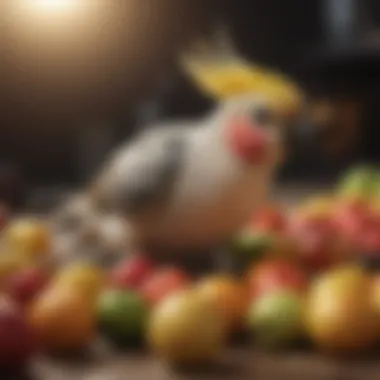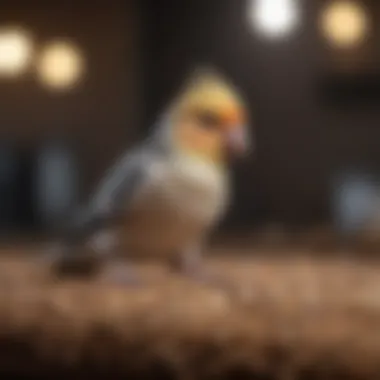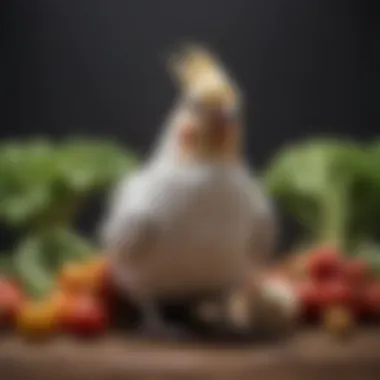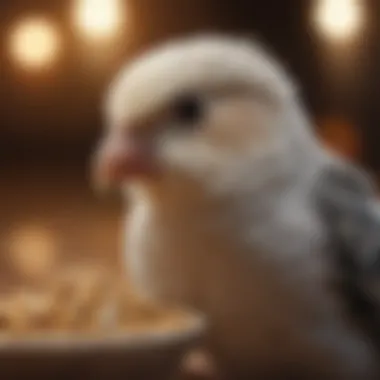Feeding a Cockatiel: Comprehensive Nutrition Guide


Intro
Providing proper nutrition for a cockatiel is crucial for its overall health and well-being. These charming birds, known for their lively personalities and vocal abilities, require a balanced diet that closely mimics what they would find in their natural habitat. As a pet owner, understanding the nutritional needs of a cockatiel can prevent health issues and ensure a happy, vibrant companion. This comprehensive guide delves into the various aspects of feeding cockatiels, including their dietary requirements, feeding schedules, common mistakes, and much more.
Understanding Your Pet
Pet Behavior Basics
Recognizing the behavior of cockatiels is essential for tailoring their nutrition effectively. Cockatiels are social birds; they often mimic sounds and interact with their environment. They exhibit curiosity and can be playful, which is an important factor when considering their feeding habits. Observing their preferences for certain foods will inform how to create a stimulating feeding routine.
Common Breed Characteristics
Cockatiels come in several color mutations, but their basic nutritional needs remain constant. They typically weigh between 80 to 100 grams and have a lifespan of over 15 years with proper care. Their environment influences their appetite and dietary preferences, so understanding these breeds helps in offering appropriate nutrition.
Species-Specific Needs
Feeding cockatiels involves recognizing the specific nutritional components they require. They are granivorous, meaning their diet primarily consists of seeds, fruits, and vegetables. However, to ensure optimal health, a varied diet that includes commercial pellets designed for cockatiels is recommended.
Pet Care and Maintenance
Feeding Guidelines
Establish a feeding routine that accommodates your cockatiel’s activity level. Typically, birds should have access to fresh food daily. A balanced diet includes:
- Pellets: High-quality pellets should make up about 70% of the diet.
- Seeds: While they enjoy seeds, limit their intake to avoid obesity.
- Fruits and Vegetables: Incorporate a small selection of fresh fruits and vegetables like apples, carrots, and spinach.
Grooming Essentials
Regular grooming is important for your cockatiel’s health. Engage in feather care, and keep their beaks and nails trimmed.
Hygiene Practices
Proper hygiene is vital to prevent health issues. Clean food and water dishes daily. Regularly check and clean their living environment to remove waste and uneaten food.
Enrichment and Activities
Indoor vs. Outdoor Activities
Finding a balance between indoor and outdoor activities can enrich a cockatiel's life. Indoor activities include allowing them to fly in a safe area and engaging them with toys. Outdoor time should be supervised and in a secure space to ensure their safety.
Interactive Toys and Games
Providing interactive toys stimulates their minds. Rotating toys regularly can keep their interest alive.


Socialization Opportunities
Cockatiels thrive on social interaction, including time spent with humans and other birds. Regular interaction will encourage a healthier emotional state, which positively impacts their eating habits.
Understanding Cockatiel Dietary Needs
Understanding the dietary needs of cockatiels is fundamental to ensuring their health and longevity. Cockatiels have specific nutritional requirements that need to be met through a balanced diet. This section outlines the crucial elements of proper nutrition, emphasizing how it contributes to the overall well-being of these birds. Without addressing their unique dietary needs, pet owners can inadvertently lead to health complications, such as malnutrition or obesity.
Nutritional Requirements
Macronutrients
Macronutrients consist of proteins, fats, and carbohydrates. These components are essential for energy, growth, and maintenance of bodily functions. In cockatiels, protein is particularly vital for feather development and repair. Seeds contain fats which provide energy, but the source of these fats should be considered. High-quality pelleted diets usually offer a more balanced macronutrient profile, making them an advantageous choice. Additionally, a precise ratio of these macronutrients is essential to maintain optimal health. Failure to provide adequate macronutrients may lead to poor feather quality or lethargy.
Vitamins and Minerals
Vitamins and minerals play a critical role in the health of cockatiels. Essential vitamins include A, D, and E, which contribute to good vision, strong bones, and overall health. Minerals, like calcium and phosphorous, are crucial for skeletal health and reproduction. It is important to provide these nutrients in a proper balance. A diet lacking in essential vitamins or minerals may result in serious health issues, such as metabolic bone disease. Thus, incorporating a variety of fruits and vegetables can naturally enhance their vitamin and mineral intake. The key characteristic of these nutrients is their supportive role in metabolic processes, making them a beneficial addition to any cockatiel's diet.
Age and Dietary Considerations
Requirements for Young Cockatiels
Young cockatiels have distinct dietary requirements that differ from those of matured birds. Their bodies are still growing, necessitating higher protein and specific fats for development. It is crucial to provide a varied diet that consists of specialized pellets formulated for young birds. This ensures they receive the right nutrition essential for healthy growth. A lack of proper nutrition in young cockatiels can lead to developmental issues and a frail immune system.
Changes in Diet for Older Birds
As cockatiels age, their dietary needs evolve. Older birds may require fewer calories due to reduced activity levels, but their need for specific nutrients remains. Soft foods and moist diets may become easier for them to consume. Moreover, older birds have a tendency to develop health issues that may necessitate dietary adjustments. It's essential to adapt their diet to cover any deficiencies that could arise as they age. The unique feature of adjusting an older bird's diet is that it not only helps in maintaining health but also in managing common age-related ailments.
A proper diet can increase the quality of life for cockatiels at every age.
For those caring for cockatiels, being aware of these dietary needs is essential. Understanding how different life stages influence nutrient requirements helps in formulating a suitable feeding strategy.
Types of Foods for Cockatiels
Understanding the different types of foods available for cockatiels is essential for their health and well-being. A well-balanced diet should include a variety of food types, each offering its unique benefits. Choices made in feeding directly affect the overall health, energy levels, and longevity of these birds. Pet owners should carefully consider the nutritional value each food type brings to the table.
Pelleted Diet
Benefits of Pellets
Pelleted diets are one of the most popular choices among cockatiel owners. A primary advantage is that they provide balanced nutrition in each pellet. This design helps prevent selective eating. Cockatiels tend to pick their favorite seeds if offered a mix, which often lacks essential nutrients. Pellets are formulated to include all necessary vitamins and minerals. Moreover, they are convenient to store and serve.
Choosing Quality Pellets
When selecting pellets, it's crucial to choose high-quality brands. Look for pellets that list whole grains and seeds among the first ingredients. Some products are fortified with extra vitamins, which can be beneficial. Quality pellets ensure that your bird gets the nutrients it needs without added sugars or artificial colors. It is important to check for expiration dates, as fresher products will have a higher nutrient content.


Seed-Based Diet
Seed Mixes
Seed mixes remain a staple in the diet of many cockatiels. These mixes often include various seeds such as millet, sunflower, and canary seeds. They are popular due to the appeal of seeds to birds. They also allow for some degree of variety in taste. However, seed mixes should not be the only source of nutrition, as they typically lack essential vitamins.
Limitations of Seed-Only Diet
While seed mixes may seem appealing, relying solely on them for nutrition can lead to deficiencies. Seeds are generally high in fat, which can lead to obesity if not monitored. Additionally, they do not provide all the necessary vitamins and minerals. Restricting a cockatiel’s diet solely to seeds compromises the health of the bird in the long term, potentially leading to ailments like fatty liver disease.
Fruits and Vegetables
Safe Options for Cockatiels
Fruits and vegetables should be incorporated into a cockatiel's diet. Many options are safe and beneficial, such as apples (without seeds), carrots, and leafy greens like spinach. These foods provide vital nutrients and hydration that seeds and pellets cannot offer alone. The freshness of fruits and vegetables adds variety and helps to stimulate a cockatiel's curiosity about food.
Importance of Fresh Produce
Offering fresh produce is particularly important for maintaining the bird's overall health. The vitamins and minerals found in fruits and vegetables support immune function and improve feather quality. Fresh food also encourages natural foraging behavior, which is crucial for mental stimulation. Choose seasonal fruits and organic vegetables whenever possible, as they are often more nutrient-dense.
Fresh fruits and vegetables should make up about 20% of a cockatiel's daily diet, ensuring a balanced intake of vital nutrients.
An awareness of the types of food and their values is imperative for the proper care of cockatiels. Understanding the limitations and benefits of each category will contribute significantly to their nutritional balance and overall health.
Feeding Schedules and Amounts
Feeding schedules and amounts play a crucial role in maintaining the health and wellbeing of cockatiels. Proper timing and portion control can help prevent obesity, ensure a balanced diet, and promote overall digestive health. Establishing a consistent feeding routine not only aids in digestion but also allows bird owners to monitor their pets’ eating habits closely. This attention to diet can directly impact a cockatiel's energy levels and longevity.
Determining Portion Sizes
General Guidelines
Establishing portion sizes is essential for ensuring that cockatiels receive the correct nutritional intake. The average cockatiel generally requires about 1/4 to 1/2 cup of food daily, but this can vary depending on size, age, and activity levels. Providing a caloric breakdown of the diet can help pet owners maintain balance. A diet consisting of 50-70% pellets, along with fruits and vegetables, complements their overall nutritional needs. This guideline is beneficial as it provides pet owners with an easy way to calculate servings without leading to over or under-feeding. Being aware of these general guidelines allows owners to focus on a more systematic approach towards feeding, which can help track any dietary shifts over time.
Adjusting for Activity Level
The activity level of a cockatiel can significantly influence its dietary needs. A more active bird may require higher quantities of food compared to a less active one. Cockatiels love to play and fly, and these activities burn calories. Adjusting portion sizes based on activity can prevent weight gain or loss, keeping the bird healthy. Owners should observe their birds’ behavior and energy levels to determine if they need to increase or decrease food portions. A key aspect of this adjustment is that it fosters awareness about each individual bird's unique requirements. Neglecting to modify portions according to their lifestyle can result in health problems, emphasizing the importance of this adjustment in feeding practices.
Establishing Feeding Routine
Daily Feeding Patterns
Daily feeding patterns contribute to the overall wellbeing of cockatiels. Establishing consistent feeding times helps regulate their digestive system and can lead to healthier eating habits. Most birds thrive on routines, and feeding at the same time each day can create anticipation, which benefits their behavioral health. Incorporating a feeding schedule can simplify the process of designing and maintaining a balanced diet, ensuring that owners are meeting their birds' needs efficiently. A predictable routine also assists in observing any changes in appetite or preferences, which is essential for identifying health issues early on.


Monitoring Food Intake
Monitoring food intake is an important practice for maintaining the health of cockatiels. Keeping an eye on how much food is consumed allows owners to identify changes that may indicate health concerns. It is critical to regularly check for uneaten food, as this can signal either a lack of interest in certain items or potential health problems. Regular monitoring can also help in adjusting food portions and types as needed. This practice provides a comprehensive view of a cockatiel's eating habits, ensuring they are getting the nutrition they require. By paying close attention to food intake, owners can quickly adapt to any dietary needs that arise.
"Regular monitoring of what your cockatiel eats can lead to better health outcomes and longer life."
Well-managed feeding schedules and amounts ultimately lead to healthier, happier cockatiels. By being mindful of portion sizes and feeding routines, pet owners can ensure their birds receive balanced nutrition. Adapting to an individual bird's needs promotes a proactive approach to their health, safeguarding their well-being in the long run.
Common Feeding Mistakes
Feeding your cockatiel properly demands not just knowledge of what to include in their diet, but also awareness of common mistakes pet owners make. Recognizing these pitfalls can help ensure a balanced diet that promotes overall health and longevity. By understanding these mistakes, you can better avoid unnecessary health issues and support your bird’s well-being.
Overreliance on Seeds
Health Implications
One significant mistake is relying too heavily on seeds. While seeds may appear as a favored food option, they lack essential nutrients required for a cockatiel's health. The high fat content in many seed mixes can lead to obesity, liver problems, and other ailments. Moreover, seeds often do not provide sufficient vitamins and minerals. This deficiency can result in conditions like feather plucking and malnutrition, ultimately affecting the bird's immune system. The general health implications underscore the need to diversify their diet.
How to Transition to a Balanced Diet
Transitioning your cockatiel from a seed-based diet to a more balanced one is crucial. Introduce pellets gradually, mixing a small amount with their usual seeds. This method helps your bird adapt to new tastes and textures. Slowly increase the percentage of pellets while decreasing the seeds over time. Also, incorporating fresh fruits and vegetables can enhance their diet significantly. This process may require patience, but it is essential to promote better health and longevity for your pet.
Ignoring Allergies and Sensitivities
Identifying Food Allergies
Identifying food allergies is another common mistake. Some cockatiels may develop sensitivities to certain foods. Observing your bird for unusual behaviors or physical symptoms is key. Common signs include changes in droppings, feather issues, or digestive complaints. Recognizing these signs early can lead to necessary changes in their diet, improving their overall health and comfort. It’s important to explore different diets and track which foods your cockatiel responds best to, ensuring a suitable nutritional balance.
Common Allergens for Cockatiels
Some foods are known allergens for cockatiels. These include certain seeds, nuts, and even vegetables like corn and beans. Understanding these common allergens can protect your bird from distressing reactions. Ensuring variety while being mindful of ingredients will help avoid pitfalls associated with allergens. Being cautious with new foods is important for both immediate and prolonged well-being of your cockatiel.
"A healthy diet is crucial for the vibrant life of your cockatiel."
Finale
In this article, we have delved into the importance of proper nutrition for cockatiels. As pet owners, one must recognize that diet is a fundamental aspect of a bird's overall health. Cockatiels require a well-balanced diet that includes a variety of foods to meet their unique nutritional needs. Misunderstanding these needs can lead to significant health issues, affecting their lifespan and quality of life.
Recap of Nutritional Essentials
To summarize our findings, it is crucial to remember the essential components of a cockatiel’s diet. A stable diet must include both pelleted food and occasional seeds, along with colorful vegetables and fruits.
- Macronutrients such as carbohydrates, proteins, and fats are vital.
- Vitamins and minerals like calcium and vitamins A, D, and E support growth and metabolic processes.
- Young birds need specific attention to their dietary needs, while older cockatiels may require adjustments to maintain their health.
Tailoring a feeding schedule that reflects the individual's activity level will also aid in managing their dietary intake.
When constructing a well-rounded meal plan, consider the diversity in food types. Incorporating fresh produce provides enrichment that is beneficial for mental stimulation, making feeding time an engaging experience for your pet. Addressing common feeding mistakes will foster a healthy relationship with food and enhance their overall well-being.
Encouragement for Ongoing Education
Education does not stop here. Pet care evolves, and continuous learning about your cockatiel's dietary requirements is beneficial. As a responsible owner, stay updated with verified resources and community knowledge. Engaging with other bird enthusiasts through forums such as Reddit or social media can open your eyes to new feeding methods and care practices.
Moreover, consulting with avian veterinarians will provide tailored insights into dietary considerations unique to your bird. Join local bird clubs or online groups to share experiences and tips. As you deepen your understanding of avian nutrition, you can improve the life quality of your cockatiel.







